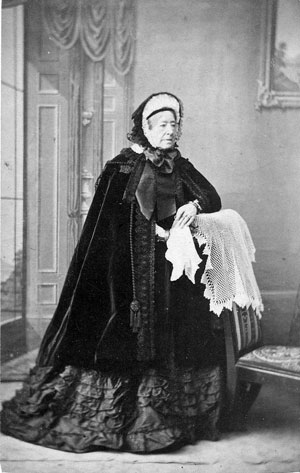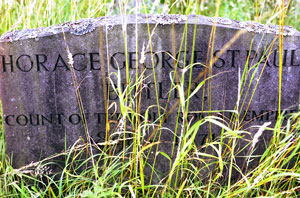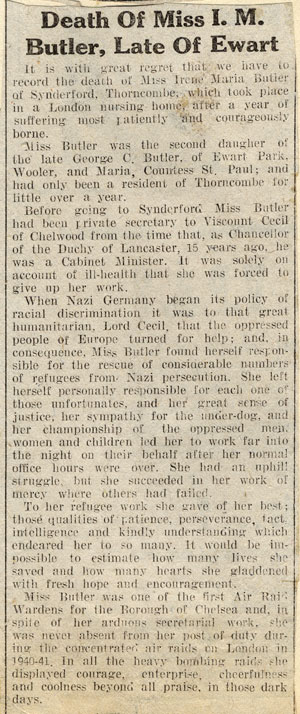




Jane Eliza Grey
Born 8th May 1842 at Milfield Hill
Married Sir Horace St Paul Bart
Died at Ewart 9 Jan 1881

9 North View Wimbledon, (crossed out) Station Hotel Newcastle Jan 19 1893
My dearest Mother Today has passed and gone, and Mia and I are husband and wife. It was a fine yellow sunrise with a soft feeling in the air, & long bars of cloud rested across the saffron sky where the sun was rising as I looked out of my window at Milfield at 7.30 a.m. It promised fine weather, & though at 9 there was a slight drifting shower, the morning’s promise was splendidly fulfilled. We have been blessed with the finest day of the whole winter. The Milfield party started in 3 conveyances, at 10 a.m. sharp. No 1 contained Peter, Ralph, Freda and Olive (in white and gold) No 2 contained Christian, Hen, Capt Burton and me, and the 2 boys Neil and Ivor. The third contained the Milfield servants. I had a new frock coat, lilac tie, and straw-coloured gloves & was by common consent agreed to be an awful swell. Capt Burton was the only other one who had a frock coat, as he was to be best man. We drove the long way to Kirknewton, past Ewart Lodge gates, and through Akeld, about 6 miles. The sun came out and shone upon the dear old hills, and made me love them more than ever. When we reached the church we found the Mortons, & Aunt Elizabeth & Tully, George Rea already there: they were going up the churchyard path to the church door. Then Capt Burton and I took our places in the chancel arch, & saw Stanley and Sargant appear through the entrance door, followed by others. Then a hymn began, & after a verse or two I saw Peter’s face very solemn, coming slowly up the aisle, & Mia on his arm, holding her head high, & stepping along in a dignified manner, not looking to the right hand or the left, & her splendid ?orgam-white train born up by the two little toddling chaps in light & dark blue, & Freda Grey between them. The service was as you know it to be. Mia said all she had to say in a clear firm voice, with no trace of nervousness. As we turned to come down the aisle after the service was over, it was very pretty to see Bob and Jack Rea following round with the rain in a wide circle, so solemnly dutiful leaving us no room to turn so that the train should be kept “taut” the whole time. After we had signed the register, in which Mia is described as being of the rank or profession of a Countess of the Holy Roman Empire, and I as a barrister at law, we went out arm in arm across the churchyard to our carriage which was lined with white inside, & started at the head of the procession of vehicles to Ewart. Twice on the way we met a rope held across the road, which stopped the horses, till we had flung sixpences and threepenny bits out for a scramble, & we were delayed with showers of rice by the hinds’ wives and daughters all laughing from ear to ear. On reaching Ewart Lodge we drove rapidly down the Wilderness Road, & in front of the house, the Ewart hands & shepherds met us, took the horses out of the shafts, & rattled us along by tugging ropes, and cheering lustily. Thus we came round to the front door where Mia’s two maids & Dormer (looking very pleased) received us as we alighted. We bowed to the assembly of carriage-pullers, & walked in, & took up our station in the Drawing Room & received the other members of the wedding party as they arrived. They came up & shook hands (or kissed) in turn, & made their several congratulations. Cyril & Sargant & Capt. & Miss Orde turned up, but Capt. Vane was unable to come. Then after general talk & the arrival of Mr & Mrs Askew Robertson, we were summoned by the gong to breakfast Mia and I headed the procession and took the two big chairs in the middle of the table: & we remembered that you were just behind our heads (in spirit). The Askews & Mortons lent 3 smart liveried footmen, & Dormer looked funny waiting among them, with rather short evening dress trousers, pink socks, & slippers! There was no speechifying; Mr. Askew proposed our healths saying he hoped the fine sunny day, was an augury of a sunny married life (or words to that effect). Then we too left the table, changed, & went off in a shower of rice to Cornhill. Half way we halted & made the driver remove all the wedding favours, & flattered ourselves nobody would “twig “us. But on reaching the station I saw 2 slippers ?hanging tied to the axles. We had a quiet journey here and we are going to have a complete rest. Your loving George.


PRIVATE
Reprinted from the Proceedings of the Berwickshire Naturalists Club.
OBITUARY NOTICE.
Mrs George Grey Butler. By Watson Askew-Robertson,
Esq., Pallinsburn.
ON April 30th 1901, in Doddington Churchyard, a highly valued Honorary Member of this Club was laid to rest, to the inexpressible grief of her husband and children, and to the deep sorrow of a wide circle of friends, in every rank of life.
Mrs G. G. Butler of Ewart Park, a countess of the Holy Roman Empire, was descended from an ancestry, on both sides, that for many long years had played an important part in history.
Her great grandfather, Count St. Paul, served as an officer with great distinction in the Austrian army, daring the seven years war, and for his services was created a Count of the Holy Roman Empire—a title transmitted to his great grand -daughter.
Her grand-father, Sir Horace St. Paul, a colonel in the army and M.P. for Bridport, and her uncle, Henry St, Paul, M.P. for Berwick, both sat many years in Parliament; and her father was taken away from her, she was his constant and inseparable companion. Very early in life she displayed considerable literary ability, and when quite a child amused herself by writing some books, that not only showed great talent and imagination, but also contained a fund of knowledge it was difficult to realize that one so young, and leading so very quiet and retired a life, could acquire.
Her father, a great admirer of Shakespeare, fostered in her a love and reverence for that greatest of all masters of human nature, and she was a life-long student of his writings. After her marriage, when she came with her husband to reside at Ewart, she promoted the establishment of a club for Shakespeare readings, which met on certain days at the houses of the different ladies that composed it, and tended to make those immortal plays more widely known, and appreciated, than they had been before on Tillside.
In 1891, after a long illness, in which she nursed him most devotedly and tenderly, Sir Horace St. Paul died, and at the age of 23 she was left alone in the world; but after two years, she was fortunate enough to form a most happy marriage with her cousin, and for eight years few people have passed pleasanter or more useful lives. United to a husband of kindred literary tastes, blessed with healthy and clever children, surrounded by objects of art, and collections of every sort and kind that can create interest or charm the eye; possessing a most delightful home and beautiful surroundings, endowed with talents and tastes that enabled her to take a wide and intelligent interest in all local, as well as scientific matters, her life promised to be one of advantage to her neighbours, and a blessing to herself and family. But such was not to be. In the prime and flower of womanhood, just when a mother's care seemed most needed by her children, and a wife's help required by a husband, like her mother (seemingly too soon) she was called away, and her pure bright spirit passed into the presence of its Creator.
Her family and her intimate friends will long cherish her memory, by those resident on her estate, and those whom her kindness assisted.
In her the Berwickshire Naturalists' Club had a very ardent supporter, and one who not only welcomed them to her house, and displayed to them the treasures accumulated by her ancestors, but delighted especially in accompanying her husband to the meetings of the Club, and adding to her store of antiquarian lore and botanical and geological information, that she was never wearied of increasing.
“Bright be the place of thy soul,
No lovelier spirit than thine,
E'er burst from its mortal control
In the orbs of the blessed to shine.
On earth thou wert all but divine,
As thy soul shall immortally be;
And our sorrow may cease to repine,
When we know that thy God it with thee.”
“ Light be the turf on thy tomb,
May its verdure like emerald be;
There should not be the shadow of gloom
In ought that reminds us of thee.
Young Flowers and an evergreen tree
May spring from the spot of thy rest,
But nor cypress nor yew let as see,
For why should we mourn for the blest."